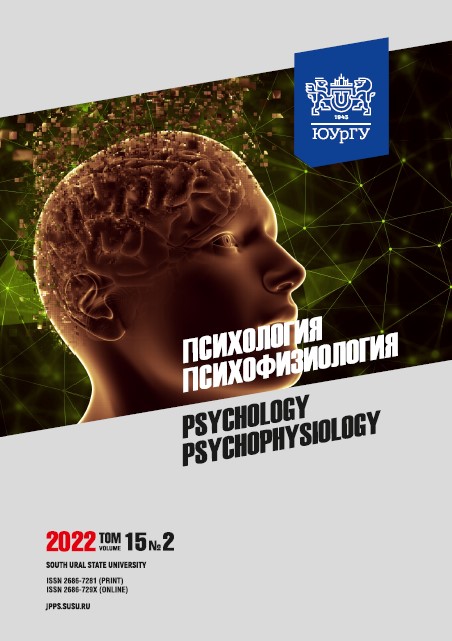Psychological targets for the treatment of maladjustment among medical staff working with COVID-19 patients in hospital settings
Abstract
Introduction: the COVID-19 pandemic is a major challenge to the global healthcare system. Russian and foreign authors emphasize that neurotic states contribute to the formation of emotional burnout, and conversely – significant emotional burnout results in the development of neurotic disorders. However, there are no publications indicating the effect of this mutual influence on the professional performance of medical staff, especially when it comes to heavy stress. Therefore, there is a need to study these aspects of the psychological condition of medical staff in infectious hospitals and identify the targets for further psychological impact. Aims: the paper aims to evaluate the degree of maladjustment among medical staff working with COVID-19 patients in hospital settings and to identify the targets of psychological correction. Materials and methods: 1) participants – 279 medical workers of infectious hospitals, of which 116 doctors and 163 nurses; 2) methods – a questionnaire for identifying and evaluating neurotic states (K. Yakhin, D. Mendelevich); methods for measuring mental burnout (V. Boyko); 3) statistical analysis – descriptive statistics; U-test Mann–Whitney; factor analysis. Results: medical workers have signs of neuroticism, among which neurotic depression is the most pronounced. It was found that emotional burnout formed in the so-called resistance phase. The following symptoms of emotional burnout were the most common: experiencing traumatic circumstances, inadequate emotional response, reduction of professional obligations, expansion of the economy of emotions, emotional and ethical disorientation. Three significant psychological targets were identified using factor analysis: “Astheno-neurotic complex”, “Conversion manifestations” and “Emotional and ethical disorientation”. Conclusion: the COVID-19 pandemic crisis resulted in psychological distress and a high risk of neuroticism among medical staff of infectious hospitals. Therefore, the subjective picture of psychological distress among medical staff is the most important target for psychological assistance and further health preservation.
Downloads
References
2. Kisely S., Warren N., McMahon L. et al. Occurrence, prevention, and management of the psychological effects of emerging virus outbreaks on healthcare workers: rapid review and meta-analysis. BMJ. 2020:369. DOI: https://doi.org/10.1136/bmj.m1642
3. Sanfilippo F., Noto A., Foresta G. et al. Incidence and factors associated with burnout in anesthesiology: a systematic review. BioMed Research International. 2017;4:1–10. DOI: https://doi.org/10.1155/2017/8648925
4. Chaban O., Khaustova O., Mishyiev V. et al. Resilience Influence to Healthcare Professionals Emotional State During COVID-19 Quarantine. Psychiatry, psychotherapy and clinical psychology. 2021;12(1):150–157 DOI: https://doi.org/10.34883/PI.2021.12.1.013
5. Bachilo E.V. Mental health of healthcare workers and interventions to preserve it during the COVID-19 pandemic. Psihicheskoe zdorove = Mental health. 2020;8:73–80. (in Russ.).
6. Odarushchenko O.I., Kuzyukova A.A., Eremushkina S.M. Comparative analysis of the level of situational and personal anxiety of medical workers and other population groups in the context of a pandemic of a new coronavirus infection – COVID-19. Vestnik vosstanovitelnoj mediciny = Bulletin of Restorative Medicine. 2020;3:110–116. (in Russ.).
7. Holmogorova A.B., Petrikov S.S. et al. Occupational burnout and its factors in healthcare workers involved in caring for patients with COVID-19 at different stages of the pandemic. Neot-lozhnaya medicinskaya pomoshch. Zhurnal imeni N.V. Sklifosovskogo = Emergency medical care. Journal named after N.V. Sklifosovsky. 2020;3:321–337. (in Russ.)
8. Leonova A.B. A comprehensive strategy for the analysis of occupational stress: from diagnosis to prevention and correction. Psihologicheskij zhurnal = Psychological journal. 2004;25(2):75–85. (in Russ.).
9. Nadirbekova A.O. Features of correction and prevention of emotional burnout syndrome in medical worker. Onkologiya i radiologiya Kazahstana = Oncology and Radiology of Kazakhstan. 2019;8:94–95. (in Russ.).
10. West C.P., Dyrbye L.N., Erwin P.J., Shanafelt T.D. Interventions to prevent and reduce physician burnout: a systematic review and meta-analysis. Lancet. 2021;388:2272–2281. DOI: https://doi.org/10.1016/S0140-6736(16)31279-X
11. Naprienko K.S., Begunov A.A. The problem of professional burnout of healthcare workers. Transportnaya infrastruktura Sibirskogo regiona = Transport infrastructure of the Siberian region. 2019;1:125–129. (in Russ.).
12. Verna V.V., Izzetdinova A.A. Prevention of professional burnout of medical workers during the spread of the coronavirus infection COVID-19 pandemic. Azimut nauchnyh issledovanij: ekonomika i upravlenie = Azimuth of scientific research: economics and management. 2020;4:91–94. (in Russ.).
13. Lyalyukova E.A., Evseeva T.V., Romanova E.P. Chronic fatigue and burnout syndrome in nurses – organizers and methods of prevention. Glavnaya medicinskaya sestra = Chief Nurse. 2003;8:99–104. (in Russ.).
Cacchione P.Z. Moral Distress in the Midst of the COVID-19 Pandemic. Clinical Nursing Research. 2020;29(4):215–216. DOI: https://doi.org/10.1177/1054773820920385
15. Pervichko E.I., Konyuhovskaya YU.E. Psychological well-being of doctors and medical personnel in the context of the COVID-19 pandemic. Psihiatriya, psihoterapiya i klinicheskaya psihologiya = Psychiatry, psychotherapy and clinical psychology. 2020;3:595–608. (in Russ.).
16. Dolgova E.M., Polidanov M.A., Eroshina O.D. et al. Results of a survey of medical workers working with coronavirus infection in various regions of the Russian Federation. Psihosomaticheskie i integrativnye issledovaniya = Psychosomatic and integrative research. 2020;3:301. (in Russ.). Available at: http://user.pssr.pro/articles/343 (accessed 09.09.2021).
17. Reshetova T.V., Mazurok V.A., Zhigalova T.N. Emotional Burnout, Asthenia and Depression in Medical and Social Workers – correction Resources. Obozrenie psihiatrii i medicinskoj psihologii imeni V.M. Bekhtereva = Review of Psychiatry and Medical Psychology named after V.M. Bekhterev. 2012;3:105–111. (in Russ.).
18. Trifonov C.B., Tretyakov N.V., Avkhymenko M.M. Features of the work of medical workers in emergency situations and methods of correction. Medicinskaya pomoshch = Health care. 2005;4:33–37. (in Russ.).
19. De Hert S. Burnout in Healthcare Workers: Prevalence, Impact and Preventative Strategies. Local and Regional Anesthesia. 2020;13:171–183. DOI: https://doi.org/10.2147/LRA.S240564
References on translit
-Copyright (c) 2022 Psychology. Psychophysiology

This work is licensed under a Creative Commons Attribution-NonCommercial-NoDerivatives 4.0 International License.



